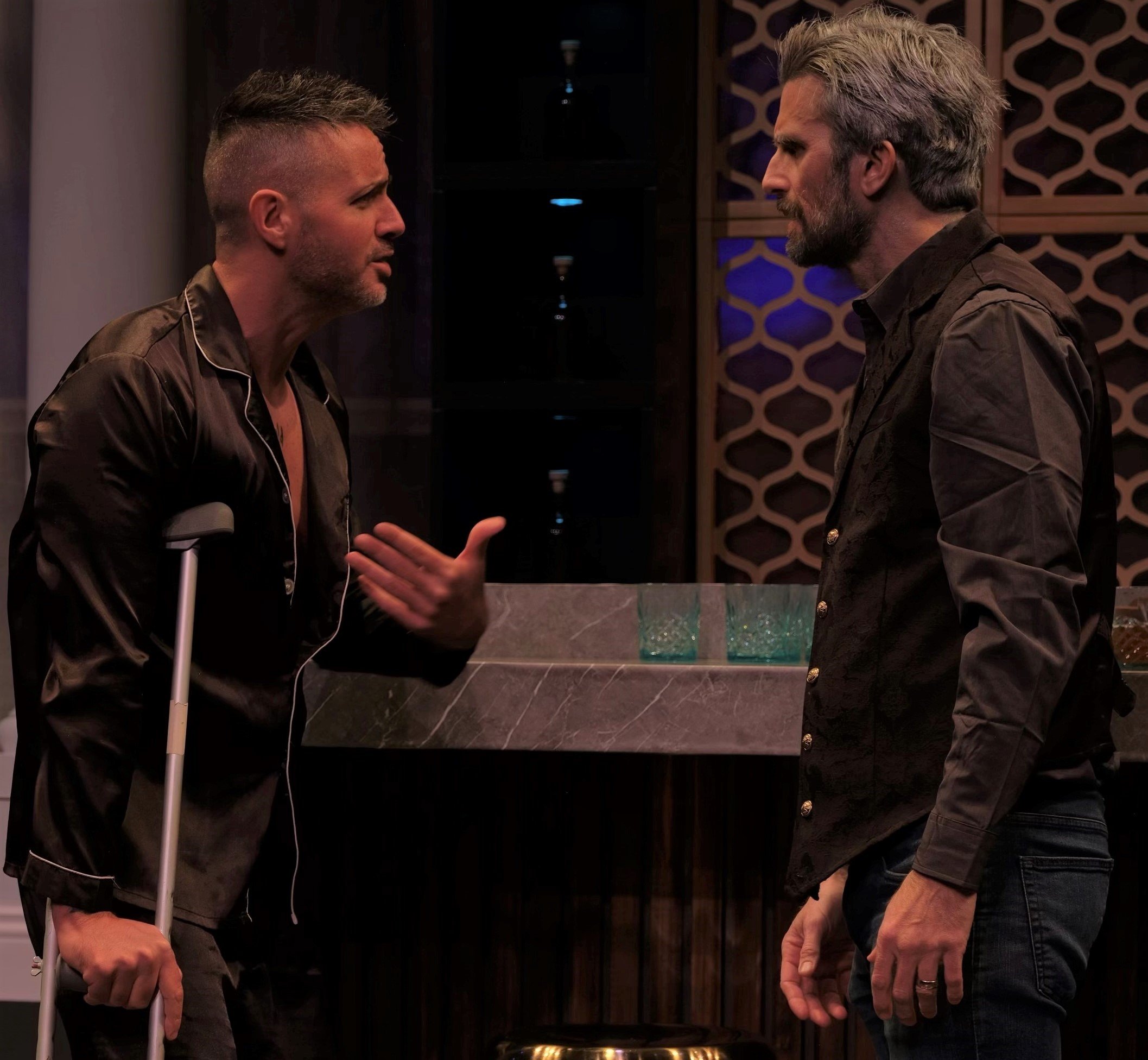Matt de Rogatis as Brick and Frederick Weller as Big Daddy in the Ruth Stage “re-engagement” of Tennessee Williams’s Cat on a Hot Tin Roof.
Last summer the Ruth Stage production of Tennessee Williams’s 1955 Pulitzer Prize–winning Cat on a Hot Tin Roof opened at Off-Broadway’s Theatre at St. Clement’s. The critical responses were uniformly mixed-to-negative, and OffOffOnline’s Charles Wright described it as a “lumbering version” of the play under Joe Rosario’s direction. Now in a “re-engagement,” as the publicity materials describe the current iteration, the production has been substantially recast, and there are a few directorial modifications. While this Cat 2.0 still lumbers, there is a noticeable improvement along with glimmers of fresh insight into the mendacious, caustic, and fiercely combative characters who populate Williams’s Mississippi Delta estate.
Brick registers his disdain for his wife Maggie (Courtney Henggeler), who desperately wants to rekindle the flames in their burnt-out marriage.
The play focuses on the internecine battles among the Pollitt family members and in-laws. First, there are Brick (Matt de Rogatis) and Maggie (Courtney Henggeler), a married and childless couple who have become estranged. The recent suicide of Brick’s friend Skipper has made the tension even thicker, and Brick drowns his sorrow in alcohol. Maggie desperately wants a baby with Brick in order to assure that they will inherit the family estate rather than Brick’s brother Gooper (Adam Dodway). Brick scathingly tells her, “But how in hell on earth do you imagine—that you’re going to have a child by a man that can’t stand you?”
Gooper’s meddling wife Mae (Christine Copley) has different designs. Using her five children (whom Maggie calls “no-neck monsters”) and a sixth one on the way, she intends to trump Brick and Maggie. She knows time is on her side because the family’s patriarch, Big Daddy (Frederick Weller), celebrating his 65th birthday, is in the late stages of cancer. He and his fawning wife Big Mama (Alison Fraser) are the only ones who do not know he is dying because the family doctor (Jim Kempner) agreed to minimize the diagnosis. Of course, truths come out, and Big Daddy rages, “All liars, all liars, all lying dying liars!”
“The production benefits ... from changes in several key performances. ”
Rosario tends to over-accentuate the melodramatic elements. The three acts end with musical underscoring (with sound design by Tomás Correa), and dramatic cinematic lighting effects (designed by Christian Specht) offer the stage equivalent of sentimental film close-ups. Set designer Matthew Imhoff’s sprawling bedroom suite—with a rather ludicrous exposed shower behind the bar—is sleek and modern, and the costumes (credited to Ruth Stage) are suitably tacky. By setting the play in the present, though, the squabbling, mean-spirited, nouveau riche characters seem to spring not from Tennessee Williams so much as The Real Housewives of Mississippi.
The production benefits, however, from changes in several key performances. As Mae, Copley is a delightful foil for Maggie, and she is appropriately and amusingly insidious. Dodway is a buttoned-up and all-business Gooper, and the show wisely keeps the no-neck monsters offstage. Previously, the five children were represented by two actors, who looked about 20 years old. Fraser returns and is a standout as the alternately steely and kittenish Big Mama.
Big Daddy berates Big Mama (Alison Fraser) during his 65th-birthday celebration. Photographs by Miles Skalli.
Of course, the success of Cat on a Hot Tin Roof comes down to the play’s central triumvirate, Maggie, Brick (performed again by de Rogatis, who is adequate in a thankless part), and Big Daddy. If Henggeler lacks the lithe and simmering sexuality of the former Maggie, she more strongly and clearly conveys the character’s desperation and manipulativeness. Her Act I monologues do not yet achieve the musicality one hopes to glean from Williams’s writing, but at least she offers a glimpse of a woman whose clawing and scratching on a proverbial “hot tin roof “are a result of childhood poverty. She tells Brick, “That’s how it feels to be as poor as Job’s turkey and have to suck up to relatives that you hated because they had money and all you had was a bunch of hand-me-down clothes and a few old moldy three percent government bonds.”
Casting Weller as Big Daddy is intriguing, but unfortunately it doesn’t work. Weller reads much younger than 65 on stage, and his scenes with Brick come across as two brothers rather than father and son. Also, he relies on sarcastic vocal imitations when sniping at his family. Another bad decision was to costume him in skinny jeans. The actor’s bulging thighs and impressive calves belie the character’s imminent death from cancer that has “spread all through him and it’s attacking all his vital organs including the kidneys.”
Ultimately, this Cat falters, but one must appreciate the production’s resilience while waiting for a sturdier revival of Williams’s taut family drama.
Tennessee Williams’s Cat on a Hot Tin Roof, presented by Ruth Stage, plays through March 31 at the Theatre at St. Clement’s (423 W. 46th St.). Performances are 7 p.m. on Monday, Wednesday, and Thursday; 8 p.m. on Friday and Saturday; matinees are 2 p.m. on Wednesday and Saturday and 3 p.m. on Sunday. For tickets and information, visit ruthstage.org/cat.





